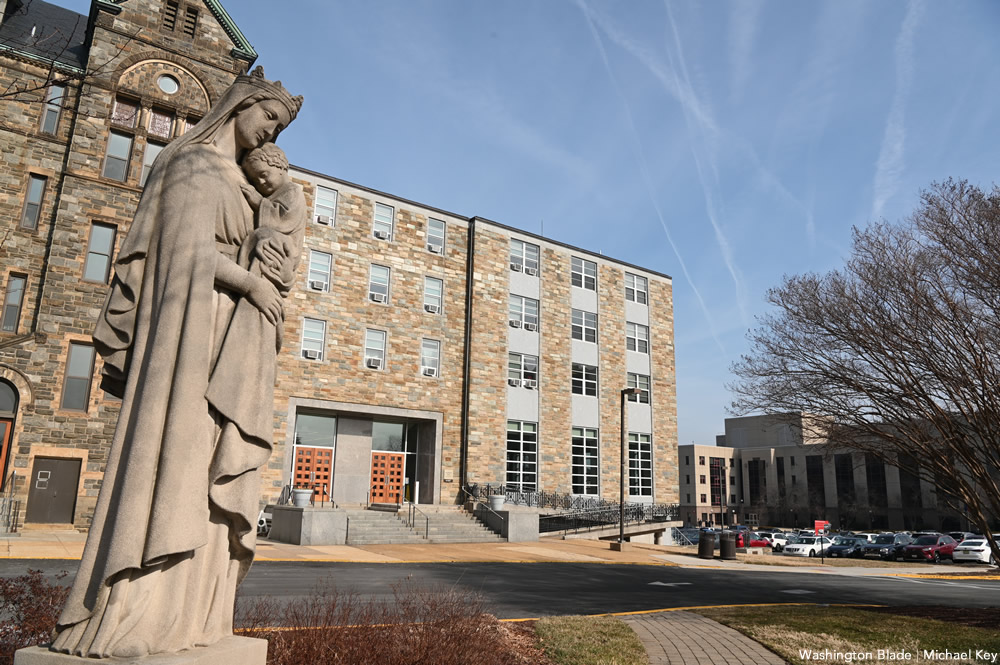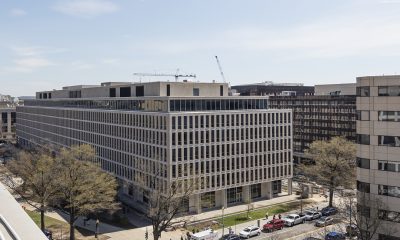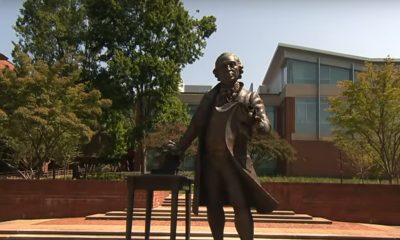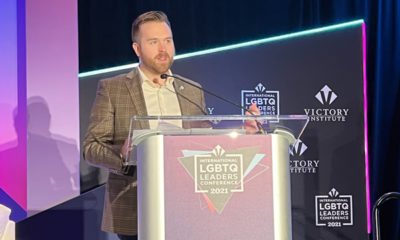Local
Catholic University LGBTQ student group remains unrecognized
CUAllies formed in 2009

The only on-campus queer student organization at the Catholic University of America, CUAllies, is still fighting for official recognition.
Despite operating “underground,” the club’s roughly 10 members meet regularly to talk about issues facing LGBTQ college students, to create friendships and to connect LGBTQ students and allies with one another. Since the formation of CUAllies in 2009, the administration at Catholic University, most notably President John Garvey, has denied the club official recognition multiple times.
“Just the act of having the university recognize us would be a huge step because it would make people feel way more welcome,” said CUAllies President Ash Samuels. “The nature of having a club that operates under the radar makes you feel like they have to operate under the radar and so just being recognized would make people feel a lot more welcome.”
Additionally, without recognition CUAllies does not have access to the same resources as official student organizations. For example, they cannot rent rooms on campus for meetings, receive funding for events, and are prohibited from advertising club meetings or events on fliers on campus. According to Samuels, the club uses space at the Center for Cultural Engagement, where Director Javier Bustamante allows the club to meet and advertise events.
According to Samuels, CUAllies has been advised by the Dean’s Office to wait until next year to reapply when a new university president will replace Garvey. Until then, Samuels said the group still plans to hold meetings in-person, and he hopes to bring in speakers to talk to members about mental health and issues facing LGBTQ college students.
The last attempt by CUAllies to gain recognition was in March 2021, when the Catholic University’s Student Government Association passed a resolution after hours of public comment from students to support a resolution for the club to request official status. The request, however, was denied by Garvey.
“It was an interesting SGA meeting,” said Samuels. “A lot of people came to public comment and spoke their minds. There was a lot of homophobia.”
Catholic University is one of the 180 campuses deemed unsafe for LGBTQ youth on Campus Pride’s “Worst List.” Campus Pride, an organization that advocates for safe and inclusive college campuses for LGBTQ students, stated on their website that “Catholic University of America has qualified for the Worst Life because it has an extensive and well-documented history of anti-LGBTQ discrimination.”
In addition to repeatedly depriving LGBTQ students of the right to have an official student club, the university has also displayed its homophobic ideology by filing an amicus brief in the 2019 U.S. Supreme Court case Bostock v. Clayton County. In the brief, the university argued that the campuses should be allowed to discriminate based on sexual orientation or gender identity under the Civil Rights Act of 1964.
“This campus has repeatedly proven that they do not support LGBTQ rights, LGBTQ equality,” said Campus Pride Executive Director Shane Windmeyer.
A 2021 survey by the Religious Exemption Accountability Project, an organization that promotes equity for LGBTQ college students at Christian colleges, said that students at Christian colleges are 15 times more likely to report that their gender or sexual identity has prevented them from being accepted by others on campus compared to LGBTQ students at non-Christian colleges.
The pandemic has increased this sense of isolation, as students were forced to attend classes online and did not have access to the same social networks that were once offered in person on many campuses. Although mental health struggles have increased overall for college students overall throughout the pandemic, research has shown that LGBTQ individuals were more likely to have struggled with depression, anxiety, or suicidal thoughts than people identifying as straight.
Attending a university that already has limited resources for its LGBTQ student population, combined with the isolating effects of the pandemic, makes the Catholic University increasingly worrisome for LGBTQ students from a mental health perspective.
“It is a pretty awful environment from the standpoint of mental health if your campus did not have inclusion or had limited inclusion for LGBTQ policies, programs, or practices before the pandemic, the pandemic has only worsened that because of the isolation that these students feel,” said Windmeyer.
Samuels said that CUAllies has served as an important place for students at the Catholic University to meet other queer students, with many members making their first contact with other LGBTQ students through the club. However, Samuels said that operating remotely during the pandemic made it difficult to feel the same level of connection, despite the fact that the group was still meeting routinely over Zoom.
“The feeling of isolation is amplified for LGBTQ students, especially on this campus,” said Samuels. “You might not have friends who you are out to or you might not have friends at all. If you don’t have [club meetings] in person in order to make those connections, and you are already isolated, it makes it a lot harder.”
Despite not having an officially recognized LGBTQ student organization, the Catholic University offers groups orientated towards LGBTQ students through its Counseling Center and Campus Ministry.
The Counseling Center runs a weekly therapy group called MOSAIC, which “provides an environment where LGBT-identified and straight students can come together to learn about available resources, discuss various topics related to personal wellness, and build a supportive network with other students,” according to the Counseling Center’s webpage.
Samuels, who is an active participant in MOSAIC, said that both the therapy group and the Counseling Center are “very LGBTQ+ friendly.” Samuels said he routinely encourages members of CUAllies to get connected with the Counseling Center during club meetings.
According to Samuels, therapists at the Counseling Center have told him that they often get students who identify as LGBTQ, but are hesitant to join CUAllies because they are perceived as being “too liberal or not Catholic enough” despite the organization not having any political or religious affiliation and being welcoming to people of all backgrounds.
Additionally, Catholic University’s Campus Ministry offers a faith group called ‘Beyond the Labels’ which defines itself as a ministry for LGBTQ students “to support each other in their Catholic Christian life by forming holistic friendships,” according to Campus Ministry’s website.
The group was formed last fall by Father Jude DeAngelo, director of Campus Ministry.
“Because we are a Catholic school I think there is a population of students who are trying to integrate their faith with all the different labels that they have either chosen or that people put on them,” said DeAngelo to the Washington Blade. “I just want to have a place where students can come and they can be themselves and they can talk about their faith and their struggles to be Catholic Christians.”
On “Beyond the Labels,” Samuels said, “I think [DeAngelo] has the right intentions, but it still has that risk that people could turn it into a negative thing or misconstrued his words.”
Samuels said that leadership at CUAllies has expressed their concerns to the Counseling Center that “Beyond the Labels” could be potentially harmful towards LGBTQ students. Samuels said that he encourages people who are in need to seek out the Counseling Center first.
DeAngelo did not offer a comment to the Blade on whether he believed CUAllies should be officially recognized by the university, however, according to Samuels, DeAngelo has been an advocate for CUAllies to be officially recognized by the university.
Windmeyer said what the Catholic University has done with its ministry has been replicated at other campuses with harmful policies against LGBTQ students as a push to better their public image.
He said that these colleges try to, “create a narrative that shows that [they] are compassionate, that [they] recognize, underneath our ministry, our LGBTQ group, but [they] are not going to recognize them as student organizations, they have to do it through the ministry. That in itself is just telling me that they are just doing enough to pacify their students, they do not see Catholicism as giving LGBTQ people the human dignity and worth that they deserve.”
Windmeyer noted that other Catholic Universities, such as the University of Notre Dame — which has an official LGBTQ student organization — have made improvements throughout the years to be more inclusive of their LGBTQ student population.
The Catholic Church’s stance on LGBTQ-related issues has improved as well. Last year Pope Francis stated that he endorsed civil unions. However, despite these advancements, activists in conversation with the Blade have remarked church teachings on homosexuality and gender identity remain largely unchanged.
Samuels said that he hopes that the LGBTQ faith group run by DeAngelo will be a step to help the university advocate for CUAllies to become recognized. DeAngelo expressed that he is interested in getting more members of CUAllies involved with “Beyond the Labels,” specifically, he said wants to create joint day-retreat programs with the club.
In the past, “Beyond the Labels” partnered with CUAllies on a day retreat focused on forgiveness. Samuels, who was not a member of CUAllies during the forgiveness retreat, said that he would be more interested in partnering on a team-building retreat instead of focusing on forgiveness because many of CUAllies members are not Catholic.
“I am hopeful that it will lead him to be a larger advocate for us to be a club in the future, but I do also worry that they will just say ‘oh look we already have this program we don’t need you guys,’” said Samuels.
Catholic University did not return the Blade’s request for comment for this story.
Virginia
Arlington LGBTQ bar Freddie’s celebrates 25th anniversary
Owner asks public to support D.C.-area gay bars

An overflowing crowd turned out Sunday night, March 1, for the 25th anniversary celebration of Freddie’s Beach Bar, the LGBTQ bar and restaurant located in the Crystal City section of Arlington, Va.
The celebration began as longtime patrons sitting at tables and at the bar ordered drinks, snacks, and full meals as several of Freddie’s well-known drag queens performed on a decorated stage.
Roland Watkins, an official with Equality NoVa, an LGBTQ advocacy organization based in the Northern Virginia areas of Arlington, Alexandria, and Fairfax County, next told the gathering about the history of Freddie’s Beach Bar and the role he said that owner Freddie Lutz has played in broadening the bar’s role into a community gathering place.
“Twenty-five years ago, opening a gay bar in Arlington was not a given,” Watkins told the crowd from the stage. “It took courage, convincing, and a deep belief that our community belongs openly, visibly, and proudly,” he said. “And that belief came from Freddie.”
Watkins and others familiar with Freddie’s noted that under Lutz’s leadership and support from his staff, Freddie’s provided support and a gathering place for LGBTQ organizations and a place where Virginia elected officials, and candidates running for public office, came to express their support for the LGBTQ community.
“Over the past 25 years, Freddie’s has become more than a bar,” Watkins said. “It has become a community maker.”
Lutz, who spoke next, said he was moved by the outpouring of support from long-time customers. “Thank you all so much for coming tonight and thank you all so much for your support over the past 25 years,” he said. “I can’t tell you how much that means to me and how much it’s kept me going.”
But Lutz then said Freddie’s, like many other D.C. area gay bars, continues to face economic hard times that he said began during the COVID pandemic. He noted that fewer customers are coming to Freddie’s in recent years, with a significant drop in patronage for his once lucrative weekend buffet brunches.
“So, I don’t want to be the daddy downer on my 25-year anniversary,” he said. “But this was actually the worst year we’ve ever had,” he added. “And I guess what I’m asking is please help us out. Not just me, but all the gay bars in the area.” He added, “I’m reaching out and I’m appealing to you not to forget the gay bars.”
Lutz received loud, prolonged applause, with many customers hugging him as he walked off the stage.

In an official statement released at the reveal event Capital Pride Alliance described its just announced 2026 Pride theme of “Exist, Resist, Have the Audacity” as a “bold declaration affirming the presence, resilience, and courage of LGBTQ+ people around the world.”
The statement adds, “Grounded in the undeniable truth that our existence is not up for debate, this year’s theme calls on the community to live loudly and proudly, stand firm against injustice and erasure, and embody the collective strength that has always defined the LGBTQ+ community.”
In a reference to the impact of the hostile political climate, the statement says, “In a time when LGBTQ+ rights and history continue to face challenges, especially in our Nation’s Capital, where policy and public discourse shape the future of our country, together, we must ensure that our voices are visible, heard, and unapologetically centered.”
The statement also quotes Capital Pride Alliance CEO and President Ryan Bos’s message at the Reveal event: “This year’s theme is both a declaration and a demand,” Bos said. “Exist, Resist, Have Audacity! reflects the resilience of our community and our responsibility to protect the progress we’ve made. As we look toward our nation’s 250th anniversary, we affirm that LGBTQ+ people have always been and always will be part of the United States’s history, and we will continue shaping its future with strength and resolve,” he concluded.
District of Columbia
Capital Pride board member resigns, alleges failure to address ‘sexual misconduct’
In startling letter, Taylor Chandler says board’s inaction protected ‘sexual predator’

Taylor Lianne Chandler, a member of the Capital Pride Alliance Board of Directors since 2019 who most recently served as the board’s secretary, submitted a letter of resignation on Feb. 24 that alleges the board has failed to address instances of “sexual misconduct” within the Capital Pride organization.
The Washington Blade received a copy of Chandler’s resignation letter one day after she submitted it from an anonymous source. Chandler, who identifies as transgender and intersex, said in an interview that she did not send the letter to the Blade, but she suspected someone associated with Capital Pride, which organizes D.C.’s annual LGBTQ Pride events, “wants it out in the open.”
“It is with a heavy heart, but with absolute clarity, that I submit my resignation from the Capital Pride Alliance Board of Directors effective immediately,” Chandler states in her letter. “I have devoted nearly ten years of my life to this organization,” she wrote, pointing to her initial involvement as a volunteer and later as a producer of events as chair of the organization’s Transgender, Gender Non-Conforming, and Intersex Committee.
“Capital Pride once meant something profound to me – a space of safety, visibility, and community for people who have often been denied all three,” her letter continues. “That is no longer the organization I am part of today.”
“I, along with other board members, brought forward credible concerns regarding sexual misconduct – a pattern of behavior spanning years – to the attention of this board,” Chandler states in the letter. “What followed was not accountability. What followed was retaliation. Rather than addressing the substance of what was reported, officers and fellow board members chose to chastise those of us who came forward.”
The letter adds, “This board has made its priorities clear through its actions: protecting a sexual predator matters more than protecting the people who had the courage to come forward. … I have been targeted, bullied, and made to feel like an outsider for doing what any person of integrity would do – telling the truth.”
In response to a request from the Blade for comment, Anna Jinkerson, who serves as chair of the Capital Pride board, sent the Blade a statement praising Taylor Chandler’s efforts as a Capital Pride volunteer and board member but did not specifically address the issue of alleged sexual misconduct.
“We’re also aware that her resignation letter has been shared with the media and has listed concerns,” Jinkerson said in her statement. “When concerns are brought to CPA, we act quickly and appropriately to address them,” she said.
“As we continue to grow our organization, we’re proactively strengthening the policies and procedures that shape our systems, our infrastructure, and the support we provide to our team and partners,” Jinkerson said in her statement. “We’re doing this because the community’s experience with CPA must always be safe, affirming, empowering, and inclusive,” she added.
In an interview with the Blade, Chandler said she was not the target of the alleged sexual harassment.
She said a Capital Pride investigation identified one individual implicated in a “pattern” of sexual harassment related behavior over a period of time. But she said she was bound by a Non-Disclosure Agreement (NDA) that applies to all board members and she cannot disclose the name of the person implicated in alleged sexual misconduct or those who came forward to complain about it.
“It was one individual, but there was a pattern and a history,” Chandler said, noting that was the extent of what she can disclose.
“And I’ll say this,” she added. “In my opinion, with gay culture sometimes the touchy feely-ness that goes on seems to be like just part of the culture, not necessarily the same as a sexual assault or whatever. But at the same time, if someone does not want those advances and they’re saying no and trying to push you away and trying to avoid you, then it makes it that way regardless of the culture.”
When asked about when the allegations of sexual harassment first surfaced, Chandler said, “In the past year is when the allegation came forward from one individual. But in the course of this all happening, other individuals came forward and talked about instances – several which showed a pattern.”
Chandler’s resignation comes about five months after Capital Pride Alliance announced in a statement released in October 2025 that its then board president, Ashley Smith, resigned from his position on Oct. 18 after Capital Pride became aware of a “claim” regarding Smith. The statement said the group retained an independent firm to investigate the matter, but it released no further details since that time. Smith has declined to comment on the matter.
When asked by the Blade if the Smith resignation could be linked in some way to allegations of sexual misconduct, Chandler said, “I can’t make a comment one way or the other on that.”
Chandler’s resignation and allegations come after Capital Pride Alliance has been credited with playing the lead role in organizing the World Pride celebration hosted by D.C. in which dozens of LGBTQ-related Pride events were held from May through June of 2025.
The letter of resignation also came just days before Capital Pride Alliance’s annual “Reveal” event scheduled for Feb. 26 at the Hamilton Hotel in which the theme for D.C.’s June 2026 LGBTQ Pride events was to be announced along with other Pride plans.




















